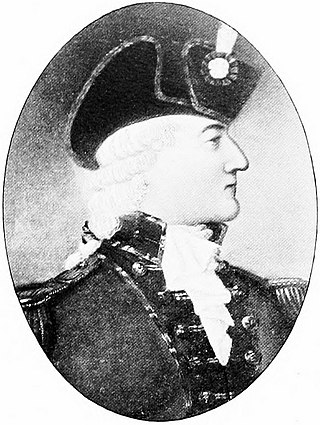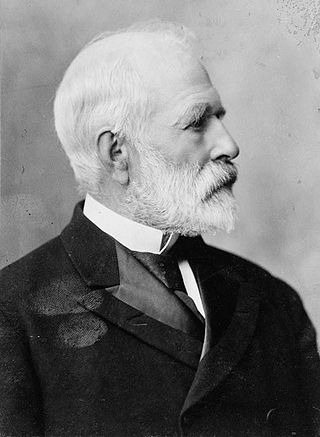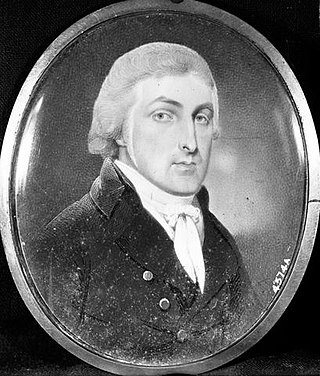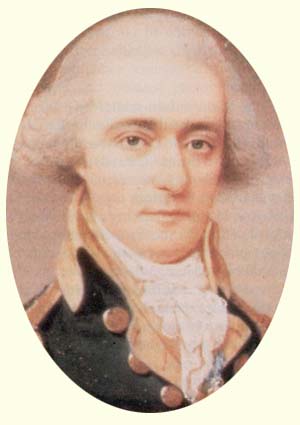Related Research Articles

Benjamin Franklin was an American polymath who was active as a writer, scientist, inventor, statesman, diplomat, printer, publisher, forger and political philosopher. Among the leading intellectuals of his time, Franklin was one of the Founding Fathers of the United States, a drafter and signer of the United States Declaration of Independence, and the first United States Postmaster General.

Jean Baptiste Charles Henri Hector, comte d'Estaing was a French general and admiral. He began his service as a soldier in the War of the Austrian Succession, briefly spending time as a prisoner of war of the British during the Seven Years' War. Naval exploits during the latter war prompted him to change branches of service, and he transferred to the French Navy.

John Broome was an American merchant and politician who was Lieutenant Governor of New York, from 1804 to 1810.

Benjamin Franklin Tracy was a United States political figure who served as Secretary of the Navy from 1889 through 1893, during the administration of U.S. President Benjamin Harrison.

The 6th Massachusetts Regiment also known as the 4th Continental Regiment was raised on April 23, 1775, under Colonel John Nixon outside of Boston, Massachusetts. The regiment would see action at the Battle of Bunker Hill, New York Campaign, Battle of Trenton, Battle of Princeton and the Battle of Saratoga. The regiment was furloughed June 12, 1783, at West Point, New York and disbanded on November 3, 1783.
The 12th Virginia Regiment was raised on September 16, 1776, at Williamsburg, Virginia, for service with the (U.S.) Continental Army. The regiment saw action in the Battle of Brandywine, Battle of Germantown, Battle of Monmouth and the Siege of Charleston. Most of the regiment was captured at Charlestown, South Carolina, on May 12, 1780, by the British and the regiment was formally disbanded on January 1, 1783.
William Dalrymple was a Scottish soldier and Member of Parliament (MP) in the British Parliament and Parliament of Ireland. He was the son of the Hon. George Dalrymple, brother of John Dalrymple, 5th Earl of Stair. Father of John Dalrymple, 7th Earl of Stair.
Thomas Hutchins was an American military engineer, cartographer, geographer and surveyor. In 1781, Hutchins was named Geographer of the United States. He is the only person to hold that post.

Nathaniel Lawrence was an American lawyer and politician.
Guillaume Léonard de Bellecombe was Governor General of Réunion, Saint-Domingue and Pondichéry, and a Republican revolutionary. According to most accounts he was born in 1728 in France.

William Temple Franklin Jr, known as Temple Franklin, was an American diplomat and real estate speculator. He is best known for his involvement with the American diplomatic mission in France during the American Revolutionary War. Beginning at the age of 16, he served as secretary to his grandfather Benjamin Franklin, who negotiated and agreed to the Franco-American Alliance.

William Jackson was a figure in the American Revolution and one of the Founding Fathers of the United States. He served as secretary to the 1787 United States Constitutional Convention, and as part of his duties added his signature to the United States Constitution. He also served with distinction in the Continental Army during the Revolutionary War. After the war, he served as one of President George Washington's personal secretaries.
Richard Jackson, KC, nicknamed "Omniscient Jackson", was a British lawyer and politician who sat in the House of Commons from 1762 to 1784. A King's Counsel, he acted as Official Solicitor or counsel of the Lords Commissioners for Trade and Plantations, owner of lands in New England, and colonial agent of Connecticut.
Robert Lawson was an officer from Virginia in the American Revolutionary War.
Claude Gabriel, Marquis de Choissey was a French general who served in Poland in the 1770s, and then in North America during the American Revolutionary War.
Benjamin Carpenter was a British soldier and courtier.
The 88th Regiment of Foot was an infantry regiment in the British Army from 1779 to 1783, formed during the American Revolutionary War. It was raised in Worcestershire under Colonel Thomas Keating and saw service in Jamaica. It was disbanded in England in 1783 at the end of the war.

The Halifax District Brigade was an administrative division of the North Carolina militia during the American Revolutionary War (1776–1783). This unit was established by the North Carolina Provincial Congress on May 4, 1776, and disbanded at the end of the war.
The Bute County Regiment was authorized on September 9, 1775 by the North Carolina Provincial Congress. It was subordinate to the Halifax District Brigade of militia commanded by Brigadier Allen Jones. The regiment was not engaged in any battles or skirmishes against the British during the American Revolution between 1775 and when it was disbanded on January 30, 1779. It was disbanded when Bute county was dissolved and split into Franklin and Warren counties. The regiment was split into the Franklin County Regiment and Warren County Regiment.
James Brandon (1734–1790) was an early pioneer in Rowan County, North Carolina and an officer in the North Carolina militia during the American Revolution. He commanded the 2nd Rowan County Regiment from 1782-1783.